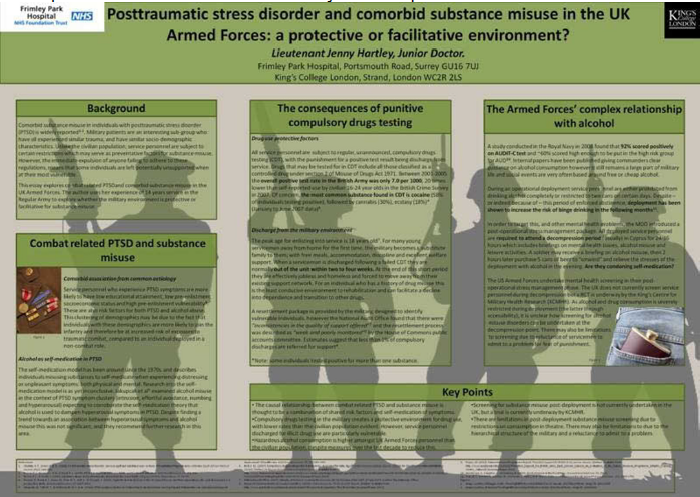Topic: EPW04 - e-Poster Walk Session 04: Philosophy and Psychiatry, Sexual Disorders, Sexual Medicine and Mental Health, TeleMental Health, Classification, Guidelines/Guidance, Quality Management, Other
Article: 1024
Attitudes of Patients and Clinicians Towards Routine Outcome Monitoring in Clinical Practice.
-
- Published online by Cambridge University Press:
- 15 April 2020, p. 1
-
- Article
-
- You have access
- Export citation
Topic: EPW04 – e-Poster Walk Session 04: Philosophy and Psychiatry, Sexual Disorders, Sexual Medicine and Mental Health, TeleMental Health, Classification, Guidelines/Guidance, Quality Management, Other
Article: 1025
A Week in the Life of a Community Psychiatrist
-
- Published online by Cambridge University Press:
- 15 April 2020, p. 1
-
- Article
-
- You have access
- Export citation
Topic: EPW04 - e-Poster Walk Session 04: Philosophy and Psychiatry, Sexual Disorders, Sexual Medicine and Mental Health, TeleMental Health, Classification, Guidelines/Guidance, Quality Management, Other
Article: 1026
Comparison of Mental Health Treatment Expenditures in Usual Psychiatric Care Between Madrid and Boston Hospital Systems
-
- Published online by Cambridge University Press:
- 15 April 2020, p. 1
-
- Article
-
- You have access
- Export citation
Topic: EPW08 - e-Poster Walk Session 08: Research Methodology, Genetics and Molecular Neurobiology, Psychoneuroimmunology
Article: 1027
The POMS Factor Structure at Six and Twelve Months Postpartum
-
- Published online by Cambridge University Press:
- 15 April 2020, p. 1
-
- Article
-
- You have access
- Export citation
Article: 1028
Validation of a New Attribution Style Inventory for Chinese Patients with Schizophrenia
-
- Published online by Cambridge University Press:
- 15 April 2020, p. 1
-
- Article
-
- You have access
- Export citation
Topic: EPW12 - e-Poster Walk Session 12: Treatment Practice
Article: 1029
Voluntary Vs Involuntary Outpatient Treatment: Comparing Two Groups with Schizophrenia
-
- Published online by Cambridge University Press:
- 15 April 2020, p. 1
-
- Article
-
- You have access
- Export citation
Article: 1030
New Approaches to Psychotic Agitation: Staccato Loxapine
-
- Published online by Cambridge University Press:
- 15 April 2020, p. 1
-
- Article
-
- You have access
- Export citation
Article: 1031
Asenapine in the Clinical Management of Mania: From Randomized Clinical Trials to Everyday Practice
-
- Published online by Cambridge University Press:
- 15 April 2020, p. 1
-
- Article
-
- You have access
- Export citation
Article: 1032
The Importance of Clinician Therapeutic Optimism in Treatment of Mental Health Disorders
-
- Published online by Cambridge University Press:
- 15 April 2020, p. 1
-
- Article
-
- You have access
- Export citation
Article: 1033
Lithium Toxicity Precipitated by Fluvoxamine: a Case Report
-
- Published online by Cambridge University Press:
- 15 April 2020, p. 1
-
- Article
-
- You have access
- Export citation
Topic: EPW12 – e-Poster Walk Session 12: Treatment Practice
Article: 1034
Antidepressant Discontinuation Syndrome in Clinical Practice
-
- Published online by Cambridge University Press:
- 15 April 2020, p. 1
-
- Article
-
- You have access
- Export citation
Article: 1035
Psychological Factors of Treatment Adherence in Patients with Essential Arterial Hypertension
-
- Published online by Cambridge University Press:
- 15 April 2020, p. 1
-
- Article
-
- You have access
- Export citation
Article: 1036
Relations Between Impulsivity, Aggression and Self-harm in Inpatients of an Open Psychiatry Ward
-
- Published online by Cambridge University Press:
- 15 April 2020, p. 1
-
- Article
-
- You have access
- Export citation
Article: 1037
The Use of Mindfulness-based Cognitive Therapy for Improving Flow Experience of Nurses in the Psychiatric Hospitals
-
- Published online by Cambridge University Press:
- 15 April 2020, p. 1
-
- Article
-
- You have access
- Export citation
Topic: EPV01 – e-Poster 01: Addictive Behaviours
Article: 1038
The Everyday Cognitive Consequences of Regular Use of Anabolic Androgenic Steroids in a Sporting Context.
-
- Published online by Cambridge University Press:
- 15 April 2020, p. 1
-
- Article
-
- You have access
- Export citation
Article: 1040
Posttraumatic Stress Disorder and Comorbid Substance Misuse in the UK Armed Forces: a Protective or Facilitative Environment?
-
- Published online by Cambridge University Press:
- 15 April 2020, p. 1
-
- Article
-
- You have access
- Export citation
Article: 1041
Opiate Substitute Prescription and Interactions with Anti-HIV Drugs.
-
- Published online by Cambridge University Press:
- 15 April 2020, p. 1
-
- Article
-
- You have access
- Export citation
Article: 1042
Injecting Drug Use as a Factor Contributing to HIV Infection
-
- Published online by Cambridge University Press:
- 15 April 2020, p. 1
-
- Article
-
- You have access
- Export citation
Article: 1043
Quality of Life and Alienation of Injection Drug Addicts with HIV-infection
-
- Published online by Cambridge University Press:
- 15 April 2020, p. 1
-
- Article
-
- You have access
- Export citation
Article: 1044
Psychosocial Factors of Alcohol Dependence in Woman Interrelated with Lesch's Typology of Alcoholism
-
- Published online by Cambridge University Press:
- 15 April 2020, p. 1
-
- Article
-
- You have access
- Export citation


